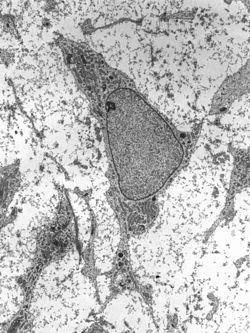Mesenchymal stem cell
| Mesenchymal stem cell | |
|---|---|

Transmission electron micrograph of a mesenchymal stem cell displaying typical ultrastructural characteristics.
|
|
| Details | |
| Identifiers | |
| Latin | Cellula mesenchymatica praecursoria |
| Code | TH H2.00.01.0.00008 |
|
Anatomical terminology
[]
|
|
Mesenchymal stem cells, or MSCs, are multipotent stromal cells that can differentiate into a variety of cell types, including: osteoblasts (bone cells),chondrocytes (cartilage cells),myocytes (muscle cells) and adipocytes (fat cells). This phenomenon has been documented in specific cells and tissues in living animals and their counterparts growing in tissue culture.
While the terms mesenchymal stem cell and marrow stromal cell have been used interchangeably, neither term is sufficiently descriptive:
In 1924, Russian-born morphologist Alexander A. Maximow used extensive histological findings to identify a singular type of precursor cell within mesenchyme that develops into different types of blood cells.
Scientists Ernest A. McCulloch and James E. Till first revealed the clonal nature of marrow cells in the 1960s. An ex vivo assay for examining the clonogenic potential of multipotent marrow cells was later reported in the 1970s by Friedenstein and colleagues. In this assay system, stromal cells were referred to as colony-forming unit-fibroblasts (CFU-f).
The first clinical trials of MSCs were completed in 1995 when a group of 15 patients were injected with cultured MSCs to test the safety of the treatment. Since then, over 200 clinical trials have been started. However, most are still in the safety stage of testing.
Subsequent experimentation revealed the plasticity of marrow cells and how their fate could be determined by environmental cues. Culturing marrow stromal cells in the presence of osteogenic stimuli such as ascorbic acid, inorganic phosphate and dexamethasone could promote their differentiation into osteoblasts. In contrast, the addition of transforming growth factor-beta (TGF-b) could induce chondrogenic markers.
...
Wikipedia
